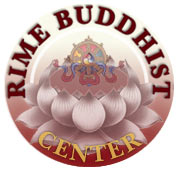Join us as we explore the rich repository of Buddhist Sutras, Pali Canon, Chinese Ta-ts’ang-ching, and Tibetan Kangyur every first Sunday of the month after the Sunday Service. Sūtra (Pali. sutta) means ‘something that was heard from someone else’ and usually connotes ‘a discourse’. In this poem it teaches that true understanding and peace come from letting go of preferences, attachments, and dualistic thinking. It emphasizes that the Great Way (the Dharma path) is accessible when the mind is free of judgment, discrimination, and clinging.
Facilitators: Lama Matthew Rice (Lobpön Palden Gocha) and Daniel Scharpenburg
Text: Śūraṅgama Sūtra: Faith Mind Poem
Join us as we explore the rich repository of Buddhist Sutras, Pali Canon, Chinese Ta-ts’ang-ching, and Tibetan Kangyur every first Sunday of the month after the Sunday Service. Sūtra (Pali. sutta) means ‘something that was heard from someone else’ and usually connotes ‘a discourse’. In this sūtra the Buddha uses the metaphor of six knots tied in a cloth to represent the obstacles to enlightenment. These knots represent the six senses and their entry points into the mind. Both delusion (tying) and liberation (untying) stem from the mind. Disengaging the senses and untying the knots reveals the voidness of all things.
Facilitators: Lama Matthew Rice (Lobpön Palden Gocha) and Daniel Scharpenburg
Text: Śūraṅgama Sūtra: The Six Knots
Join us as we explore the rich repository of Buddhist Sutras, both Pali Canon and Tibetan Kangyur every first Sunday of the month after the Sunday Service. Sūtra (Pali. sutta) means ‘something that was heard from someone else’ and usually connotes ‘a discourse’. This sūtra tells of a beggar woman’s modest lamp offering at a park in Śrāvastī, contrasted with King Prasenajit’s lavish lamp offerings. Despite her tiny amount of oil, her lamp burns brightly and cannot be extinguished, symbolizing her sincere desire for enlightenment. The Buddha smiles and prophesies her future rebirths and awakening as a buddha.
Facilitators: Lama Matthew Rice (Lobpön Palden Gocha) and Daniel Scharpenburg
Text: Nagarāvalambikā: The City Beggar Woman
Join us as we explore the rich repository of Buddhist Sutras, both Pali Canon and Tibetan Kangyur every first Sunday of the month after the Sunday Service. Sūtra (Pali. sutta) means ‘something that was heard from someone else’ and usually connotes ‘a discourse’. In the Accomplishment of the Sets of Four Qualities: The Bodhisattvas’ Prātimokṣa, Venerable Śāriputra requests the Buddha Śākyamuni to explain the conduct of bodhisattvas.
Facilitators: Lama Matthew Rice (Lobpön Palden Gocha) and Daniel Scharpenburg
Text: Bodhisattvaprātimokṣacatuṣkanirhāra – The Accomplishment of the Sets of Four Qualities: The Bodhisattvas’ Prātimokṣa
Join us as we explore the rich repository of Buddhist Sutras, both Pali Canon and Tibetan Kangyur every first Sunday of the month after the Sunday Service. Sūtra (Pali. sutta) means ‘something that was heard from someone else’ and usually connotes ‘a discourse’. The Discourse on the Not-self Characteristic was the first of the Buddha’s discourses during which his listeners became arahants.
Facilitators: Lama Matthew Rice (Lobpön Palden Gocha) and Daniel Scharpenburg
Text: Anatta-lakkhaṇa Sutta
Join us as we explore the rich repository of Buddhist Sutras, both Pali Canon and Tibetan Kangyur every first Sunday of the month after the Sunday Service. Sūtra (Pali. sutta) means ‘something that was heard from someone else’ and usually connotes ‘a discourse’. Gayāśīrṣa Hill is a pithy Buddhist scripture that describes various aspects of the Mahāyāna Buddhist path.
Facilitators: Lama Matthew Rice (Lobpön Palden Gocha) and Daniel Scharpenburg
Text: Gayāśīrṣa
Join us as we explore the rich repository of Buddhist Sutras, both Pali Canon and Tibetan Kangyur every first Sunday of the month after the Sunday Service. Sūtra (Pali. sutta) means ‘something that was heard from someone else’ and usually connotes ‘a discourse’. In the An Analysis of the Path Sutta, the Buddha Śākyamuni explains and defines the Eightfold Noble Path.
Facilitators: Lama Matthew Rice (Lobpön Palden Gocha) and Daniel Scharpenburg
Text: An Analysis of the Path Sutta: Magga-Vibhaṅga Sutta
Join us as we explore the rich repository of Buddhist Sutras, both Pali Canon and Tibetan Kangyur every first Sunday of the month after the Sunday Service. Sūtra (Pali. sutta) means ‘something that was heard from someone else’ and usually connotes ‘a discourse’. In the Accomplishment of the Sets of Four Qualities: The Bodhisattvas’ Prātimokṣa, Venerable Śāriputra requests the Buddha Śākyamuni to explain the conduct of bodhisattvas.
Facilitators: Lama Matthew Rice (Lobpön Palden Gocha) and Daniel Scharpenburg
Text: Bodhisattvaprātimokṣacatuṣkanirhāra – The Accomplishment of the Sets of Four Qualities: The Bodhisattvas’ Prātimokṣa
Join us as we explore the rich repository of Buddhist Sutras, both Pali Canon and Tibetan Kangyur every first Sunday of the month after the Sunday Service. Sūtra (Pali. sutta) means ‘something that was heard from someone else’ and usually connotes ‘a discourse’. In The Gold Sūtra, the Buddha explains that the mind of awakening is like gold because it is pure. He also teaches the analogy that just as a smith shapes gold into various forms, yet the nature of the gold itself does not change, so too the mind of awakening manifests in various unique ways, yet the nature of the mind of awakening itself does not change.
Facilitators: Lama Matthew Rice (Lobpön Palden Gocha) and Daniel Scharpenburg
Text: The Gold Sūtra
Join us as we explore the rich repository of Buddhist Sutras, both Pali Canon and Tibetan Kangyur every first Sunday of the month after the Sunday Service. Sūtra (Pali. sutta) means ‘something that was heard from someone else’ and usually connotes ‘a discourse’. In The All the Defilements Sutta, the Buddha lists seven approaches for eliminating the āsavas: deep-seated defilements that “flow out” of the mind and prevent liberation.
Facilitators: Lama Matthew Rice (Lobpön Palden Gocha) and Daniel Scharpenburg
Text: Sabbāsavasutta – All the Defilement Sutta

